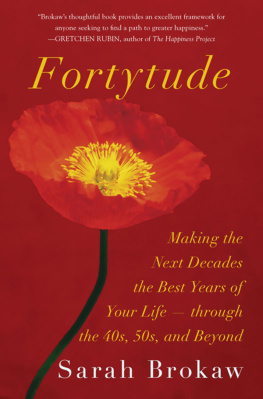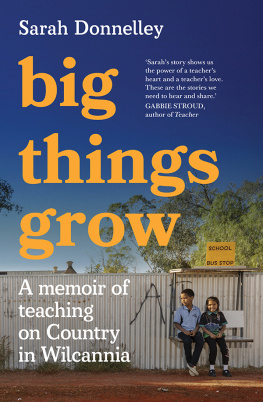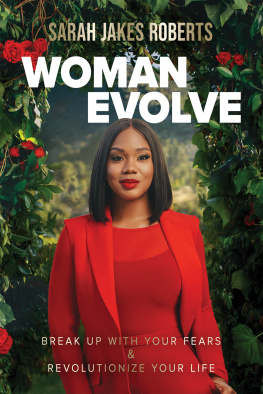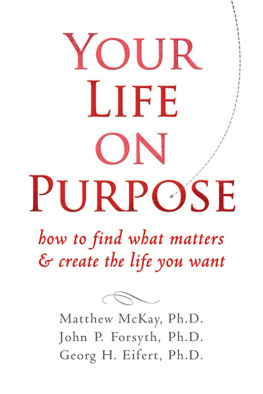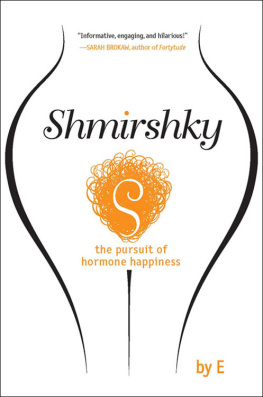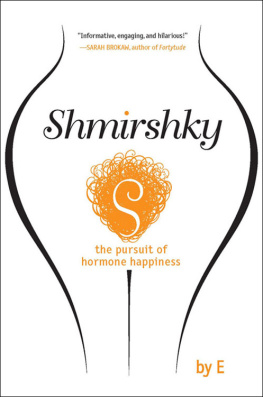Dedicated to Grandma Jean, a brown-eyed,
left-handed, five-foot-two-inch, buxom, small but mighty woman
(who has been my role model for as long as I can remember)
Contents
Preface
FORTY CANDLES
It starts when were 35.
For many women within five years of their fortieth birthday, their biggest worry isnt their relationship (or lack of one), their boss, their kids, their financial situation, or even their health.
Its the calendar.
We cant deny the fact that we age. No matter how hard we try to remain youthful, we are getting older. Aging is simply part of the natural and beautiful cycle of life, as sure as the seasons changing. Yet few events, it seems, are as unnerving to women as thinking about that fortieth candle on the birthday cake.
I first began to observe this phenomenon several years ago among the 30- to 50-year-old clientele who frequented my Manhattan therapy practice. They had a single common obsession: I dont want to turn 40. The big four-oh was the dreaded number, even for my youngest visitors. From ages 29 to 39, each woman anticipated this milestone with fear, acting as if her life would end the moment she passed into her fifth decade. In fact, a good number of my clients had so much anxiety about this critical age that it was the sole reason theyd begun to see me. I was in my late 30s, and I found myself sharing their concerns in more than the usual empathetic therapist way. Often at night, I stayed awake riddled with worries about what lay ahead in my personal and professional life.
It got me wondering: Why was it that so many womenincluding myselfhad such a powerful aversion to reaching 40? I began examining the psychological research, as well as popular writing on the subject. Someone must have explored the anxiety that the fifth decade triggers for women and have offered guidance, I thought. But no one had. And that is why, in my thirty-eighth year, I decided to write this book.
As we say good-bye to our youth, we lose our carefree sense of being immortal and having all the time in the world to figure out our lives. Many of us experience fear of the future. This books purpose is to help us remove our hands from our eyes and face our fearsand moreover, to transcend them. The truth is that our 40s can be a decade of loss, but those years also hold the potential to be a time of tremendous gain.
In the course of researching and writing this book, I facilitated discussion groups across Americafrom New York, New York, to Seattle, Washington; Oxford, Mississippi, to Provo, Utah; San Francisco, California, to Bozeman, Montana; Dallas, Texas, to Chicago, Illinois; Greenwich, Connecticut, to Orange County, California; and Memphis, Tennessee, to Washington, D.C. In addition, I conducted individual interviews with women from all different walks of life: single mothers struggling to make ends meet and high-powered executives; recovering crack addicts and Ivy Leaguers; surfers, social workers, and stay-at-home moms; women in their late 30s longing to have children and 50-plus-year-olds who already have cleared many of the hurdles well discuss; breast cancer survivors, victims of abuse, and women who have lost both their parents.
As part of this process, I asked the women to examine a long list of positive values that I had compiled. We then had conversations about which of these values most served to sustain and enhance womens lives as they entered their fifth decades. It soon became clear that the womenregardless of age, race, sexual orientation, or socioeconomic statusall were powerfully drawn to five of what I call the Core Values: grace, connectedness, accomplishment, adventure, and spirituality.
In the following chapters, Ill explore these five Core Values in depth and share the stories of the remarkable women who most embody them. These are women who have chosen to greet lifes challenges with fortitude instead of fear. They have overcome adversity, danced through lifes unpredictable turns, and found confidence, joy, and peace along the way. They are my inspiration, and I hope they will be yours, too. Lets take what theyve learned and use it to help us not only embrace the loss of youth and transcend our anxieties but also celebrate the beginning of the rest of our lives.
Introduction
THE MIDLIFE
SPARKLING MOMENT
Whether its nature or nurture or a combination of both thats to blame, we begin at age 35, with a sinking feeling in our stomachs, to recognize our own mortality. Our youthful beauty starts to fade as wrinkles become undeniable facts that we face every time we look in the mirror. We must confront our diminished sexual desirability in the eyes of society. If were on the career path, we notice competition from younger women in the workplace. If we havent yet had all the children we want, we come head-to-head with fertility issues. We start getting mammograms, and often we lose a friend, relative, or colleague to breast cancer. Many of us watch our parents fall ill or pass away. Its real: were getting older, were fragile, and one day we, too, will die.
Many women approaching 40 and beyond are struggling to define themselves as independent people as well as daughters, sisters, friends, wives, and mothers. An unsatisfying career or lack of spiritual fulfillment can further complicate the issue, causing us to ask: Is this all there is?
Unfortunately, the majority of messages that we receive from pop culture, the media, and even our friends and parents portray 40 as if its nearing the endthe end of the good times, at least. The clock is ticking. In ten years, youll be 50, and then the fun is really over. My clients often say they feel that society tells them, Youre supposed to have it all figured out by now. If you haventif youre still searching for answers in your personal or professional life, or bothyou feel like a failure.
Many women see 40 as the end of their attractiveness, their sexuality, their youthfulness, and sometimes even their creativity. Most of these fears are based on nothing more than societal myths (perhaps residues of a male-dominated culture eager to keep women down, just at the moment when they begin to flourish). We do not lose any of these qualities with ageon the contrary, as we grow older, we can feel more radiant, confident, capable, and powerful than ever. But there are very real biological pressures that increase significantly as we pass this watermark birthday: breast cancer rates skyrocket, our parents get older and pass away, and our chances of naturally conceiving a healthy child start to decline sharply at age 35.
So much negativity is attached to aging that we often come to believe our identities are tied to our ages. But this is simply not true; we are not our ages. It is possible to hold a positive view of your individual, creative path from age 40 onward because, in fact, the fifth decade is nowhere near the end of your life. In my psychotherapy practice, I explore with my clients a new excitement about having made it thus far and about going further. We identify the challenges that we face as we come to terms with our ages, and we create our identities on our own terms. What does it mean to be your most authentic self, to do what you want to do, and to enjoy your life in the way you really desire?
Turning 40 does not have to be a problem. For many women, this milestone can be a time of self-reflection, which is a truly powerful experience. It may be a time to sit with the ever-nagging question, Am I where Im supposed to be? and come to peace with what is. Or it might be a time to realize that there are steps you havent taken, roads as yet unexplored, and to make a strong commitment to moving forward in the coming years. While certain challenges inevitably coincide with embarking on your fifth decade, it can be a beautiful and invigorating time in your life.

